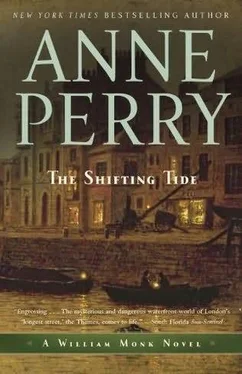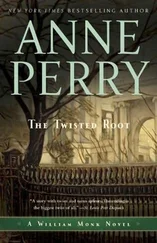Anne Perry - The Shifting Tide
Здесь есть возможность читать онлайн «Anne Perry - The Shifting Tide» весь текст электронной книги совершенно бесплатно (целиком полную версию без сокращений). В некоторых случаях можно слушать аудио, скачать через торрент в формате fb2 и присутствует краткое содержание. Жанр: Исторический детектив, на английском языке. Описание произведения, (предисловие) а так же отзывы посетителей доступны на портале библиотеки ЛибКат.
- Название:The Shifting Tide
- Автор:
- Жанр:
- Год:неизвестен
- ISBN:нет данных
- Рейтинг книги:5 / 5. Голосов: 1
-
Избранное:Добавить в избранное
- Отзывы:
-
Ваша оценка:
- 100
- 1
- 2
- 3
- 4
- 5
The Shifting Tide: краткое содержание, описание и аннотация
Предлагаем к чтению аннотацию, описание, краткое содержание или предисловие (зависит от того, что написал сам автор книги «The Shifting Tide»). Если вы не нашли необходимую информацию о книге — напишите в комментариях, мы постараемся отыскать её.
The Shifting Tide — читать онлайн бесплатно полную книгу (весь текст) целиком
Ниже представлен текст книги, разбитый по страницам. Система сохранения места последней прочитанной страницы, позволяет с удобством читать онлайн бесплатно книгу «The Shifting Tide», без необходимости каждый раз заново искать на чём Вы остановились. Поставьте закладку, и сможете в любой момент перейти на страницу, на которой закончили чтение.
Интервал:
Закладка:
“Coleridge is coming back with tea in a few minutes,” Rathbone warned. “Have you found any of the crew yet? You’ll have to tell them, even if you keep them by force. You can’t put them into the clinic, can you?”
“We haven’t found them,” Monk replied, his voice low and rasping with exhaustion. “Not any of them. They could be anywhere in the country, or back at sea on other ships going God knows where.” He remained standing. Rathbone noticed that Monk’s body was rigid. His right hand flexed and unflexed and the muscles of his jaw twitched in nervous reaction. He must be in agony over Hester alone in Portpool Lane. He would have no idea whether there were more people dead, plague raging through the place with all its horror and its obscenity. Or if they were cooped up waiting, dreading every cough, every chill or flush of heat, every moment of faintness whether mere exhaustion or the beginning of the measured agony of fever, swelling, pain, and then death.
Rathbone was overcome with relief that Margaret was not in there; it welled up inside him like an almost physical escape from pain, like the fire of brandy felt in the stomach and the blood when one has been numb with cold.
He stood facing Monk, who was gray with dread of losing all that mattered most to him and gave his life purpose and joy. If Hester died, he would be alone in a way that would be a constant ache inside him, increasing every burden, dulling any possible happiness. And Rathbone was awash with relief at his own safety. It filled him with shame.
“I saw Gould,” he said aloud, trying for his own sake almost as much as Monk’s to occupy their minds with the practical. Pity would be no help. “I believed him.” He saw the slight lift of surprise in Monk’s face. “I didn’t expect to,” he said. “He’ll make a good witness, if I have to put him on the stand. The trouble is, I don’t know what the truth is, so I’m afraid of what I’ll uncover.”
Monk was pensive. “Well, so far as we know there was no one on board the ship apart from the skeleton crew and Gould, so the only defense can be that if Gould didn’t kill him, then one of the crew did, or else it was an accident.”
“If it was an accident then it can only have happened if he fell and cracked his head open, possibly breaking his neck,” Rathbone reasoned. “And if that were the case, it should have been apparent to whoever found him. Was his neck broken? You didn’t say so.”
“No it wasn’t.”
“And you said there was so little blood you thought he was actually killed somewhere else,” Rathbone went on. “You said. .”
“I know what I said!” Monk snapped. “That was before I knew about the plague.”
“Don’t say that word!” Rathbone said sharply, his voice rising. “Coleridge will be back any minute!”
Monk winced, as though he had been caused sudden pain.
Rathbone drew in his breath to apologize, although he knew it was the truth which hurt Monk, not his words. Just at that moment there was a brisk tap on the door and Coleridge opened it, carrying in a tea tray and setting it on the table.
Rathbone thanked him and he withdrew again.
“Are you saying he died of. . illness?” Rathbone asked, passing the tea as he spoke.
“It fits the facts if Gould is telling the truth,” Monk replied, sitting down at last. He looked so weary it was going to be an effort for him to stand up again. “Hodge had to be accounted for. They couldn’t just get rid of the body, so someone took a shovel to the back of his head to make that seem the cause of death.”
Rathbone believed it. “But that’s no use as a defense for Gould,” he pointed out. “All I can think of so far is reasonable doubt, and I don’t know how to raise that without going too close to the truth.” He shivered and put his hands into his pockets. It was an uncharacteristic gesture because it pushed his trousers out of shape. “Who can I call?” he went on. “The prosecution will call the crew, who will say they know nothing. I daren’t call any medical experts, because if I question them, we would raise the issue of whether he was dead already, and if so, what caused it. His neck wasn’t broken, there was nothing to suggest heart attack or apoplexy, and the last thing on earth we can afford is to have them dig Hodge up again.”
Monk shook his head slowly, like a man in a fog of thought, too harried on every side to find his way. “You’ll have to play for time,” he said unhappily. “I need to find something to raise a doubt.”
Rathbone hated forcing the issue. Monk was exhausted, and Rathbone could barely guess at the fear which must be eating him alive. Margaret was safe. Rathbone had everything to look forward to. If he lost her, it would be his own doing: his cowardice, moral or emotional. The solution lay in his own hands. But Monk was powerless. There was nothing he could do to help. He did not even know from hour to hour if Hester was alive, still well, or already infected, suffering terribly. She was imprisoned with virtual strangers. Would they even care for her in her moments of extremity? Would they stay to nurse her, as she had nursed so many others? Would they run away in terror or inadequacy? Or would they be too close to death themselves to be able to raise a hand to fetch water, or whatever one did to ease the terror or pain of the dying? The thought made him sick with misery.
“What is it?” Monk demanded, cutting across his thoughts.
Rathbone recalled himself. “To raise reasonable doubt I have to suggest a believable alternative,” he answered. “If Gould didn’t kill him, either someone else did or it was an accident. Can you get evidence to back your original decision? Louvain wrote that paper swearing to get Hodge’s killer if you found the ivory. That’ll come out, because the undertaker will swear to it to protect himself. I can’t afford to question the medical evidence at all. They would dig the body up, and that’s a nightmare I don’t even want to imagine.”
Monk said nothing. He seemed to be lost in thought. As if noticing the tea for the first time, he poured himself a cup and drank it, wincing at the heat, and yet obviously grateful for it.
Rathbone poured some for himself as well. “Does Louvain know the truth?” he asked.
Monk looked up at him. “I really don’t know.”
“Then you’ve got to find out. At least one of us has to. If you. .”
“I’ll do it,” Monk said with such biting decision that Rathbone knew he would not raise the question again.
“If he didn’t know,” Rathbone said quietly, “then you will have to tell him. The only way he can protect himself is to testify that he was mistaken, and Hodge could have fallen and hit his head.”
“Or that Gould killed him, exactly as I first believed.”
“Do you believe it now?”
“No.” Again there was no hesitation.
“Then we’ll have to find a way of getting Louvain to testify for him, or he’ll hang,” Rathbone warned him. “We can’t let the plague loose in London to save one man, however innocent.”
Monk took a deep breath and rubbed the heel of his hand over his face. “I know. How many days till the trial?”
“Day after tomorrow.”
“I’ll see Louvain,” Monk promised. He straightened up, but there was a weariness inside him that bowed his shoulders and his face was ashen. “Durban is still hoping to find the crew.” His face crumpled. “How many people are there, Rathbone, that disappear and no one misses? How many can fall, and we all just press onward without even seeing the space they’ve left? Does anyone care? Are there people suffering, crippled with grief, and we don’t notice that either?”
Rathbone wished he had a lie good enough to give even the remotest comfort, but he hadn’t. Whether anyone missed the crewmen he had no idea. They might be dead of plague in any town in the south of England, or more probably already at sea on another ship. There was no terror spreading, no cry of quarantine, evacuation, or fire to burn it out, to exorcise it like a thing from hell. But Monk was speaking of the void in his own life that Hester’s loss would create, and Rathbone knew that.
Читать дальшеИнтервал:
Закладка:
Похожие книги на «The Shifting Tide»
Представляем Вашему вниманию похожие книги на «The Shifting Tide» списком для выбора. Мы отобрали схожую по названию и смыслу литературу в надежде предоставить читателям больше вариантов отыскать новые, интересные, ещё непрочитанные произведения.
Обсуждение, отзывы о книге «The Shifting Tide» и просто собственные мнения читателей. Оставьте ваши комментарии, напишите, что Вы думаете о произведении, его смысле или главных героях. Укажите что конкретно понравилось, а что нет, и почему Вы так считаете.












